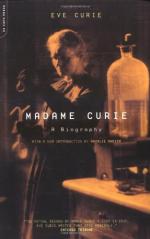|
This section contains 2,026 words (approx. 7 pages at 300 words per page) |

|
Polish-born French physicist
Marie Curie was the first woman to win a Nobel Prize, and one of very few scientists ever to win that award twice. In collaboration with her physicist-husband Pierre Curie, Marie Curie developed and introduced the concept of radioactivity to the world. Working in primitive laboratory conditions, Curie investigated the nature of high-energy rays spontaneously produced by certain elements, and isolated two new radioactive elements, polonium and radium. Her scientific efforts also included the application of x rays and radioactivity to medical treatments.
Curie was born to her two-schoolteacher parents in Warsaw, Poland. Christened Maria Sklodowska, she was the fourth daughter and fifth child in the family. By the age of five, she had already begun to suffer deprivation. Her mother Bronislawa had contracted tuberculosis and assiduously avoided kissing or even touching her children. By the time Curie was 11, both her...
|
This section contains 2,026 words (approx. 7 pages at 300 words per page) |

|


